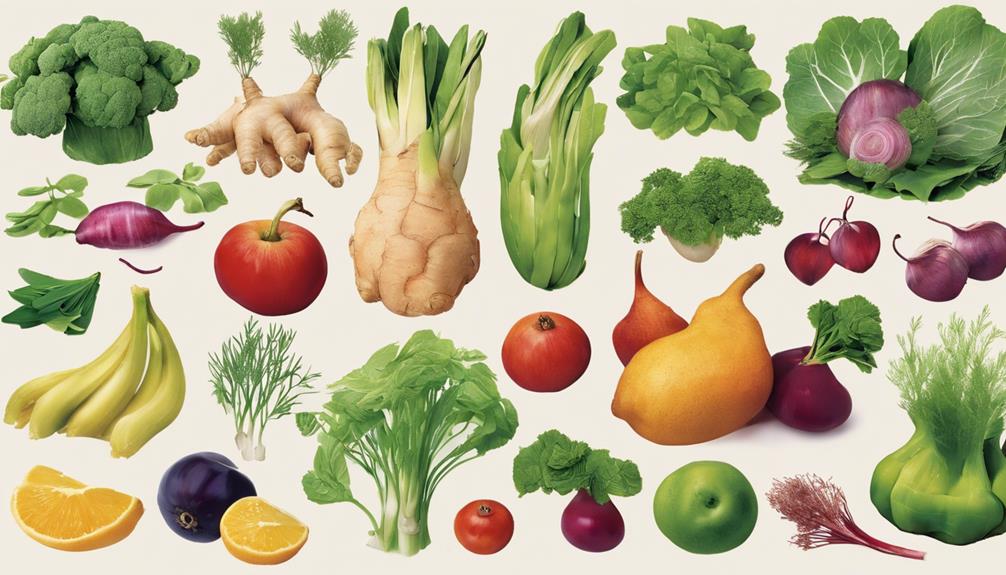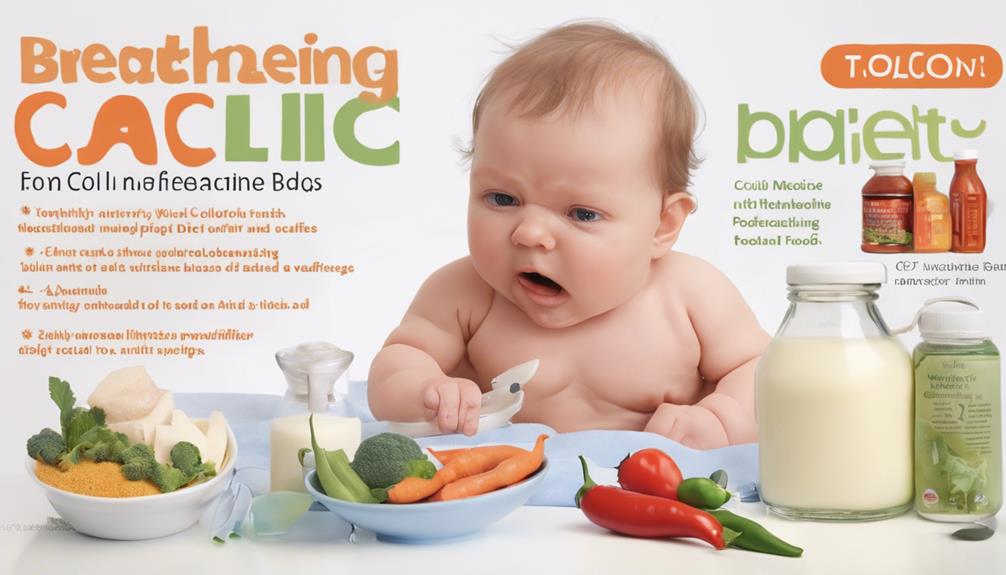We've identified key dietary adjustments that can potentially ease colic symptoms for your little one. By understanding what triggers colic, pinpointing anti-colic foods, and incorporating digestive enzymes, we aim to provide relief.
But, have you considered how these changes could impact your own well-being as a breastfeeding mom?
Stay tuned to discover the holistic benefits of an effective anti-colic breastfeeding diet that not only supports your baby's health but yours as well.
Key Takeaways
- Exclude dairy, soy, wheat, and peanuts to reduce colic symptoms.
- Incorporate probiotic-rich foods like yogurt and kefir.
- Stay hydrated to support milk production and reduce colic discomfort.
- Consult healthcare providers for personalized dietary recommendations.
Understanding Colic Triggers in Breastfeeding
Understanding the triggers of colic in breastfeeding is essential for identifying potential dietary factors that may contribute to infant discomfort. When breastfed infants experience colic, it can be distressing for both the baby and the mother. Research suggests that dairy products, particularly cow's milk, play a significant role in triggering colic symptoms.
Excluding common allergens like cow's milk, soy, wheat, peanuts, and eggs from the mother's diet has been linked to a decrease in colic incidence. Studies have shown that eliminating dairy, soy, peanuts, and wheat can reduce the risk of colic by up to 37% in breastfeeding infants. Whey, a protein found in cow's milk, has been identified as a potential culprit for colic in some babies, highlighting the importance of dairy elimination.
If cows milk intolerance is suspected, excluding dairy for 1-2 weeks and observing a reduction in colic episodes can help confirm the link. By understanding these colic triggers, mothers can make informed decisions about their diet to alleviate their breastfed baby's discomfort.
Identifying Anti-Colic Foods for Moms

To aid in alleviating colic symptoms for breastfed infants, mothers can benefit from incorporating anti-colic foods into their diets. It's important to be mindful of what we eat while breastfeeding to help reduce colic in our little ones. Some foods to avoid include common allergens like cow's milk, eggs, wheat, peanuts, and soy, as they can trigger colic symptoms in babies. On the other hand, including probiotic-rich foods such as yogurt, kefir, and kombucha can aid in easing colic symptoms for infants by promoting a healthy gut microbiome. Additionally, consuming foods high in digestive enzymes like papaya, pineapple, and kiwi can support better digestion for both mom and baby, potentially reducing colic episodes. It's vital to consult with healthcare providers or lactation consultants for personalized dietary recommendations tailored to alleviate colic in breastfed infants.
| Anti-Colic Foods | Benefits |
|---|---|
| Probiotic-rich foods | Support a healthy gut microbiome |
| Foods high in enzymes | Aid in digestion for mom and baby |
| Avoid common allergens | Reduce the likelihood of triggering colic symptoms |
| Limit processed foods | Help prevent colic in breastfed babies |
| Consult healthcare provider | Get personalized dietary recommendations |
Implementing Digestive Enzymes for Relief
Implementing digestive enzymes can be beneficial for providing relief to breastfeeding infants experiencing colic symptoms. Breast milk contains natural enzymes like amylase and lipase that aid in breaking down carbohydrates and fats, facilitating digestion in infants.
In addition to the enzymes present in breast milk, incorporating plant-based enzymes from fruits such as papaya, pineapple, and kiwi into the breastfeeding mother's diet can further support the digestive process in breastfeeding babies. These enzymes help guarantee that nutrients are effectively digested, absorbed, and utilized by the infants, reducing the risk of passing irritants or allergens through breast milk that may contribute to colic symptoms.
Common Culprits of Colic in Babies

Breastfeeding mothers may unknowingly introduce common culprits that can trigger colic symptoms in their babies. Certain foods can be the cause of colicky behavior in breastfed infants. It's essential for mothers to be mindful of what they eat to help alleviate discomfort in their little ones. Some common culprits to watch out for include cow's milk, cruciferous vegetables, and allergenic foods. These items have the potential to exacerbate colic symptoms in babies and may need to be avoided or moderated in the mother's diet.
To better understand the impact of certain foods on colic symptoms, refer to the table below:
| Culprit | Potential Impact on Colic Symptoms |
|---|---|
| Cow's milk | Allergic reactions in babies |
| Cruciferous vegetables | Gas production in babies |
| Allergenic foods | Allergies leading to colic development |
Being aware of these common triggers can help mothers make informed choices when it comes to their diet while breastfeeding. By being cautious with food choices, mothers can potentially reduce the likelihood of their babies experiencing colic symptoms.
Crafting an Anti-Colic Meal Plan
Crafting a meal plan to alleviate colic symptoms in infants involves carefully selecting foods that are gentle on their digestive systems. To create an effective anti-colic meal plan, consider the following:
- Exclude Common Allergens: Eliminate dairy, soy, wheat, and peanuts from your diet as these allergens can sometimes contribute to colic symptoms in babies.
- Incorporate Probiotic-Rich Foods: Include yogurt, kefir, and kombucha in your meals to introduce beneficial bacteria that can help ease colic symptoms in your baby's gut.
- Maintain a Balanced Diet: Make sure you consume a variety of foods rich in essential vitamins and minerals to support both your health and your baby's development.
- Stay Hydrated: Drinking plenty of water is important for milk production and overall well-being. Adequate hydration can also help in reducing colic symptoms in babies.
Consulting with a healthcare provider or a lactation consultant for personalized dietary recommendations can further optimize the effectiveness of your anti-colic meal plan.
Frequently Asked Questions
What Should Breastfeeding Mothers Eat to Prevent Colic?
We should focus on a diet that avoids common allergens and includes probiotic-rich foods like yogurt. Consulting healthcare providers before dietary changes is essential. A balanced diet can help prevent colic in breastfed babies.
What Foods Are Anti Colic for Breastfeeding?
We found that probiotic-rich yogurt, lean proteins like chicken, anti-inflammatory foods, and fiber-rich options are key in reducing colic symptoms for breastfed babies. Avoiding allergens like cow's milk and peanuts is also essential.
How Can I Reduce My Breastfed Baby's Colic?
We reduced our breastfed baby's colic by eliminating common allergens like cow's milk, eggs, wheat, peanuts, and soy from our diet. This simple change decreased colic risk by 37% and greatly improved our baby's symptoms.
What Foods Can Make Baby Gassy While Breastfeeding?
Avoiding dairy, high caffeine drinks, cruciferous veggies, spicy foods, nuts, and peanuts in our diet can help prevent gassiness in breastfed babies. These choices may reduce discomfort and colic symptoms in our little ones.
Conclusion
To sum up, by making small adjustments to our breastfeeding diet, we can help alleviate colic symptoms in our babies.
It's remarkable how something as simple as choosing the right foods can make a significant difference in their comfort and well-being.
Let's continue to prioritize their health by being mindful of what we eat, knowing that our efforts can have a lasting impact on their happiness.









